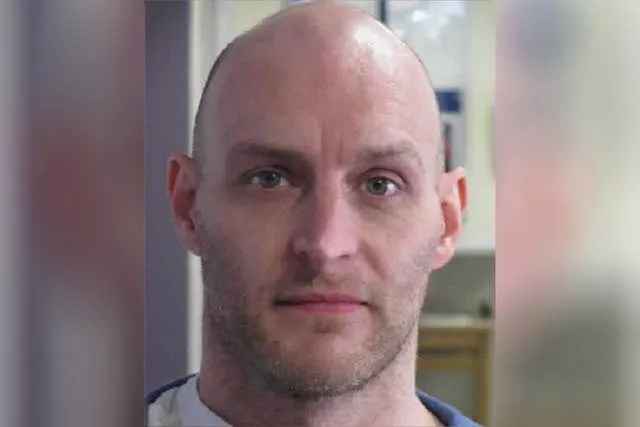A coroner has blasted the "inhumane and indefensible" treatment of a prisoner who took his own life after serving 17 years for a 23-month jail term.

Scott Rider, 45, who was one of Britain's longest-serving inmates, was given an indefinite sentence in 2005 but ended up never being released.
The controversial Imprisonment for Public Protection (IPP) sentences - in which offenders were handed minimum jail terms but no maximum - were scrapped in 2012 amid human rights concerns, but not for those already sentenced, leaving thousands languishing in jail for years beyond their original prison terms.
In light of Mr Rider's death, senior coroner Tom Osborne issued a stark warning to the government, calling for a review of all those affected by IPPs.
"On any consideration of the circumstances of Mr Rider's death, one has to conclude that his treatment was inhumane and indefensible, and that if action is not taken to review all prisoners sentenced to IPP, then there is a risk of further deaths occurring," he said.
Mr Rider's heartbroken sister is calling for the government to act to save the lives of others trapped under the "inhumane" jail terms. At least 90 IPP prisoners have died by suicide.
Her concerns were echoed by MPs, campaigners and prison experts, who urged justice minister Alex Chalk to reconsider reviewing all IPP sentences.
Lord David Blunkett told The Independent the policy, brought in when he was home secretary under Tony Blair, turned out to be a "disaster" and said Mr Rider's case was incredibly serious.
The tragic case comes as:
Prison leaders joined calls for all IPP inmates to have their sentences reviewed, with president of the Prison Governors' Association, Tom Wheatley, branding them "a blot on our legal system"
Chair of the justice committee, Sir Bob Neill, who believes the sentences are "an affront to basic decency and fairness", renewed calls for resentencing, warning: "More delay will lead to more deaths"
Life peer Baroness Claire Fox said the tragedy demonstrates how this "egregious sentence is a matter of life and death" - as new figures showed rates of self-harm among IPP prisoners soared by 26 per cent last year
Lord Blunkett, who has led calls for reform, said plans to improve progression and shorten licence periods were welcome but insisted "there's still a long way to go"
When Mr Rider died in his cell at the high-security HMP Woodhill in June 2022, he had served more than 15 years longer than his original 23-month tariff for grievous bodily harm and had given up all hope of release.
In a scathing Prevention of Future Deaths Report sent to the minister for prisons, Edward Argar, following a three-day inquest, the coroner warned there is a risk of further lives being lost if action is not taken.
Mr Osborne, the senior coroner for Milton Keynes, said Mr Rider was "one of many IPP prisoners struggling to progress" and that at the time of his death he had served 17-and-a-half years and "given up all hope of release".
The intervention was welcomed by Mr Rider's sister Michelle Mahon, 55, from Durham, who hopes his tragic death will inspire reform.
"It will mean my brother's death wasn't in vain," she told The Independent.
The latest figures show that of 2,796 IPP inmates currently incarcerated, 1,180 have never been released and 708 have served more than 10 years longer than their minimum tariff.

The mother-of-four had lost contact with her brother 22 years earlier but was devasted to learn of his death after prison officers knocked on her father's door with the news.
She said Mr Rider, the youngest of four siblings, had struggled with their parents' separation and fell into drug use at the age of 14, eventually committing offences to feed his habit.
He was first jailed in 2000 for robbing his own father, and again in 2003, but was said to have cleaned up his life and was hoping to start a family when he was handed an IPP for assaulting a colleague with a hammer following a disagreement in 2005 - the same year the sentences were introduced by New Labour.
Despite their estrangement, Ms Mahon told The Independent how she "spiralled" after learning of her brother's death, adding: "When I started reading into these IPP sentences I just couldn't believe it.
"I am not condoning what Scott did - I fully understand he did wrong and deserved to be punished - but I don't think he deserved to be in prison for 17 years for a 23-month sentence."
In the wake of his death, she has agonisingly reviewed 1,200 pages of his prison records which showed that he had moved prisons 30 times, made a previous attempt on his life and made comments saying: "I feel like I am never going to get out of here."

In a statement read to members of the jury at his inquest, Ms Mahon said Mr Rider, originally from Bradford, had been a "loving and caring" uncle to her daughter.
She said: "Until he got heavily involved in the drug scene, he was a very polite, loving and caring young kid. He was a cheeky young chap and loved spending time with his dad, going around car showrooms and taking cars out on test drives."
Under an IPP sentence, prisoners can only be released after serving their minimum tariff if they prove to a parole board they are not a risk to the public. However Mr Rider struggled to engage with prison staff and at the time of his death he had been self-isolating for more than 200 days.
Ms Mahon added: "Had Scott just been given a standard sentence he would have long since been out of custody and possibly have rebuilt his life, [and] maybe even have a family of his own."
Mr Rider's story comes as the government tabled three amendments to the Victims and Prisoners Bill to help enhance the progression, release and licence termination of IPP prisoners. However, the government has so far rejected justice committee recommendations for a resentencing exercise.
Chair Sir Bob Neill, a senior Tory, said the committee has "repeatedly warned" leaders that the jail term does lasting damage to prisoners' mental health.
"The coroner is right, all IPP sentences should be reviewed and, although the government has taken some steps to improve the parole process for such prisoners, Scott Rider's death demonstrates starkly why this is not enough," he told The Independent.
"All IPP prisoners should be resentenced to determinate terms. IPP sentences are a stain on our justice system and an affront to basic decency and fairness. More delay will lead to more deaths."
The Prison Governors' Association also backed the coroner's call for a review, with president Tom Wheatley adding: "It can't be right for people to spend so many years in prison for what in some cases were minor crimes committed during adolescence."
Lord Blunkett, who is working with a group of cross-party peers on IPP reforms, said that while they have made "some progress", he fears resentencing is unlikely to happen in an election year.
He added: "There's still a long way to go and the provision for prisoners who have never been released is the most worrying thing of all because of course that affects their mental health."
Baroness Claire Fox, who believes leaders are "running scared" in case a released prisoner commits further crimes, added: "As Mr Rider's case shows, this egregious sentence is a matter of life and death.
"No government can escape this. They will have to resentence IPP prisoners. Somebody will have to do it - and they should before more lives are lost."
A Ministry of Justice spokesperson said: "We have reduced the number of unreleased IPP prisoners by three-quarters since we scrapped the sentence in 2012, but retrospectively changing sentences poses a risk to public safety because offenders who the Parole Board have deemed unsafe for release, many of whom have committed serious violent or sexual offences, would leave prison without probation supervision and support."

















Comments